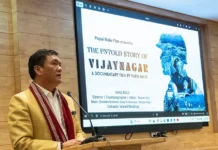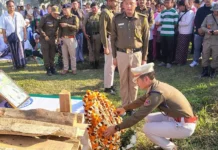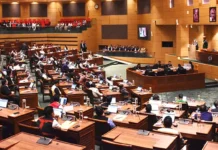[M Panging Pao]
Free and fair elections are the fundamental pillars of any vibrant democracy. Being the world’s second most populous nation and the world’s largest democracy, conduct of free and fair elections is a massive and complex affair.
Being a large and populous nation with over 10.6 lakh polling stations and 17.3 lakh VVPATs (Polling Machines) manned by over 70 Lakh officials spread over 29 states and 7 UTs, elections are conducted in stages spread over almost two months.
Over one crore police and security personnel are detailed for security purposes. The budget of conducting a general election is about Rs 4000 crores by the Election Council of India.
Similar amounts are spent by the Indian Railways, Home Ministry, and other agencies.
About Rs 22, 000 crores are spent by candidates and political parties. Total cost comes to about Rs 35,000 to Rs 40,000 crores; making the Indian general elections the second most expensive elections in the world simply to ensure democracy.
Add to this, the conduct of simultaneous assembly polls in four states, including Arunachal Pradesh.
There are about 2200 polling stations in Arunachal Pradesh and about 15,000 officials would be detailed to man and supervise these polling stations. Another 15,000 to 20,000 security personnel would also be mobilised and detailed to ensure security.
Towards successful conduct of these elections, mobilisation and training of officials started almost one year earlier and carries on till few months after the elections. Officers and officials are identified and reshuffled for training and exposure. Voting machines and VVPATS are mobilised, and polling stations are identified and inspected.
Another policy implemented by the administration months before the election is the posting of administration branch officers away from their home districts.
This upsets the lives of many officers and causes financial losses to the exchequer. The perplexing issue is that only administration officers are posted out from home districts. Engineers, doctors, forest officers and officers from other branches are not disturbed.
With officials detailed for training regularly and mass postings effected, official government work slows down, affecting the local public. Many important policy decisions are put on the back burner and files are stacked up in dusty corridors for action later.
With elections nearing, even leave of all government employees are suspended or curtailed till conduct of elections.
Another aspect is the non-announcement of new policies and stoppage of major fund releases after elections are announced and code of conduct starts. With election process continuing for almost two months plus after announcement, there is a policy paralysis for this long period wherein developmental work is slowed down.
With all official and developmental work put on a back burner, leave of all government officials curtailed and many officials transferred, it is almost akin to declaration of another emergency.
And what do we gain in the end? Democracy? Are there major changes in governance after spending almost Rs 40,000 crores of the exchequer’s money? With this huge amount, many development projects can be funded. Are all these expenditure and policy paralysis worth it? (The contributor is retired Group Captain, Indian Air Force)




